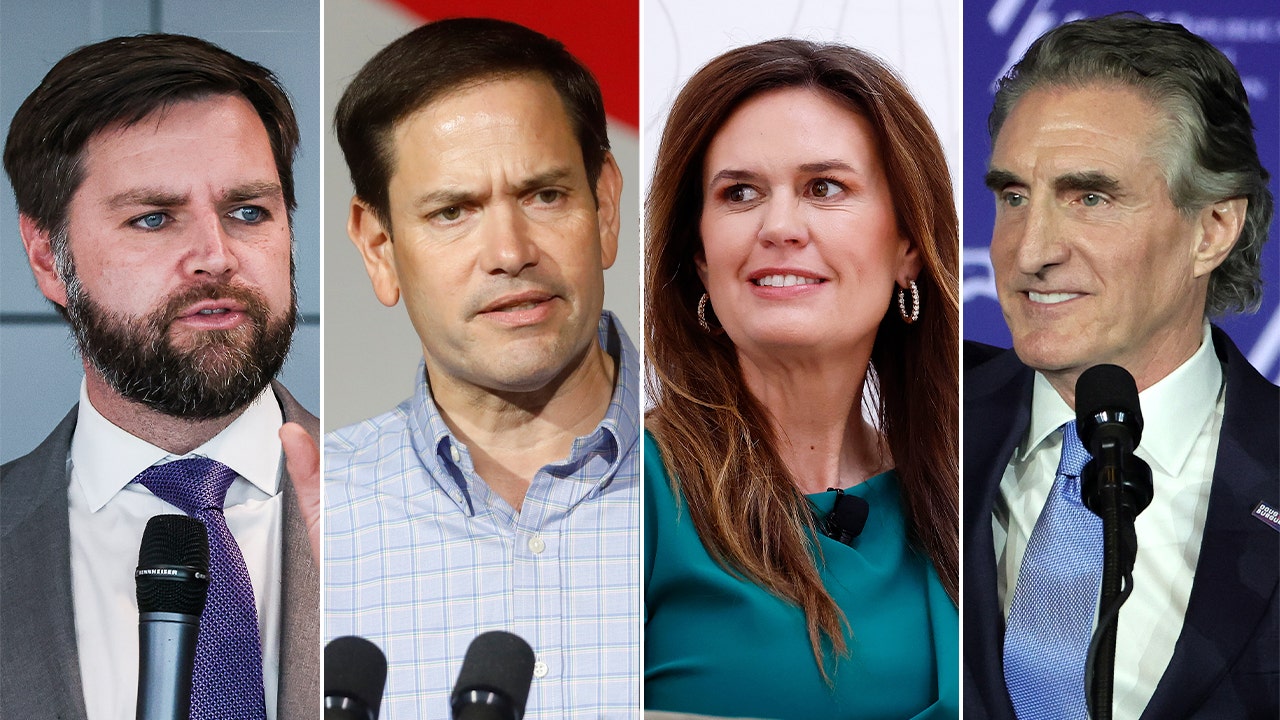World
EU makes progress on new fiscal rules pending Franco-German deal
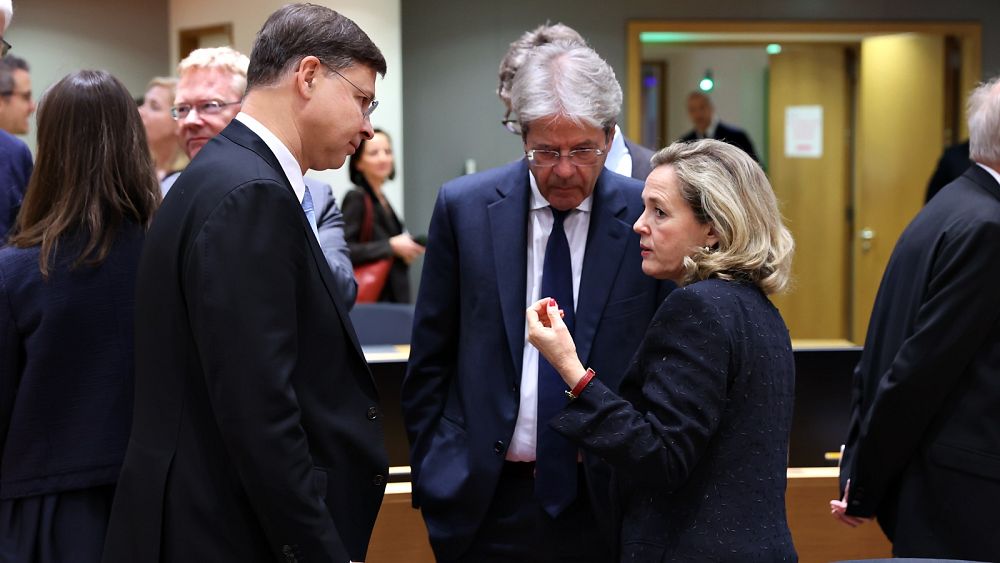
Economic and finance ministers of the European Union made on Thursday significant progress on the reform of the bloc’s fiscal rules. But the final push depends on a Franco-German compromise.
An extraordinary meeting has been pencilled for later this month, hoping talks between Paris and Berlin will have borne fruit by then.
The two heavyweight capitals have embraced opposing views in the months-long debate, which needs to be resolved by year’s end to allow member states to design their next budgets under the new rules. Failure to do so will lead to the reactivation of the old norms, suspended since the onset of the COVID-19 pandemic.
France and Germany have in recent days intensified bilateral contacts to hash out their differences, raising expectations that a breakthrough will soon be in sight. French Finance Minister Bruno Le Maire met earlier this week with his German counterpart, Christian Lindner, in Paris and the two will get together again in Berlin in the coming days.
The talks focus on the most divisive issues of the fiscal overhaul, namely the numerical safeguards to guarantee an annual reduction of debt and deficit levels. France has so far resisted this idea, arguing that automatic and uniform norms would be counterproductive and potentially constrain economic growth. But Germany has firmly held its ground, backed by a group of member states, including the Netherlands, Austria, Sweden and Denmark, who want to ensure public spending is effectively kept in check.
The latest “landing zone” circulated by Spain, the country that currently holds the EU Council’s rotating presidency, left blank the percentage points of the debt-reduction and deficit-controlling mechanisms, suggesting this will be the very last hurdle to be jumped.
“It is progress that the idea of safeguards and benchmarks is acknowledged with regard to the debt-to-GDP ratio and the annual deficit. But what has to be considered is the level of ambition,” Lindner said on Thursday morning, before heading to the ministerial meeting in Brussels. “So now it is about numbers, not only instruments. I’m optimistic but much more work has to be done.”
“We’re in an open debate among partners and friends. It’s not about deadlines or red lines – it’s about horizons,” he added.
Le Maire described the Franco-German mood as “very positive and constructive” and said bilateral discussions were going “in the right direction.” He underlined the final outcome should bring forth fiscal rules that are “credible” and “solid” and leave enough financial space for countries to invest in high-tech and the green transition.
“What is at stake behind those negotiations is the whole credibility of the European Union,” Le Maire said. “Facing economic difficulties (and) geopolitical risks, there is a need to come to an agreement by the end of 2023, we cannot wait (until) 2024 with the perspective of the European elections.”
Two more meetings to go
What is on the table today is the reform of the Stability and Growth Pact, the fiscal rules that have guided the bloc’s finances since the late 1990s.
Under the present framework, member states are required to keep their budget deficits under 3% of gross domestic product (GDP) and their public debt levels below 60% in relation to GDP — thresholds that many governments exceed after years of intense spending to cushion a succession of overlapping crises.
In the legislative proposal presented in April, the European Commission kept untouched the 3% and 60% targets, which some economists consider arbitrary and obsolete, but made considerable alterations to the way in which the two figures should be met.
Each member state would be asked to design a mid-term fiscal plan to cut down its deficit levels at a credible pace and put public debt on a “plausible downward path”. The country-specific blueprints would be first negotiated between the European Commission and the capitals, and later approved by the EU Council.
The fiscal adjustments necessary to meet – or at least head towards – the 3% and 60% marks would be carried out over a period of four years and could be extended to seven years in exchange for further reforms and investments.
While the combination of fiscal sustainability and national ownership has been welcomed across the board, it has not been enough to speed up negotiations: capitals have spent the last months haggling over provisions of extreme technicality, including the debt-reduction safeguards.
Spain initially targeted Thursday’s meeting as the desired date to seal a deal on a revised legislative proposal. But following a series of “50 meetings and contacts” with the other 26 member states, the presidency opted instead to table a “landing zone” to move forward the discussions, said Nadia Calviño, Spain’s acting economy minister.
“Today we see there is agreement on the core elements and mechanism of the new fiscal rules,” Calviño said after the ministerial meeting.
Building on the “significant progress” made on Thursday, she explained, the Spanish presidency will translate the working document into a proper legal proposal, which will then be debated by ministers in an extraordinary meeting later this month.
Ideally, Calviño noted, the definitive deal will be sealed on 8 December, when economy and finance ministers are expected to gather again. Any possible Franco-German compromise will be “integrated” into the presidency’s work, she added.
“Our assessment is that we may need two (more meetings) to finalise and reach an agreement on the legal text,” Calviño said.
The Council’s potential agreement will then need to undergo negotiations with the European Parliament before coming into force sometime in early 2024.

World
Argentina's Milei shuts up critics with miracle turnaround of economy, strong security policies

President Javier Milei of Argentina continues to stun his critics with an economy that has outperformed expectations and continues along an ambitious path for national security, including pursuit of a NATO global partnership.
“The fact that you have a president, head of state, who is defending the free market, who is defending the role of entrepreneurs and businessmen as creators of value and just defending deregulation when the tendency in Latin America and much of the West has been to regulate the economy . . . I think that’s very positive, not only for Argentina, but for the region as a whole and maybe beyond,” Daniel Raisbeck, a policy analyst at the CATO Institute, told Fox News Digital.
Milei won the presidency in November last year and prompted concern from some in the West that he would lead his country down a road to ruin with libertarian policies that would make an already troubled economy even weaker. Voters wanted economic relief from a market hit with some of the highest inflation in the world.
Those attitudes have shifted just months later as Milei has enacted a raft of policy changes: The International Monetary Fund (IMF) agreed to release a tranche of loans due to Argentina under a bailout program thanks to Milei’s government managing to create a fiscal surplus in the previous fiscal quarter and bring inflation down.
ARGENTINA REPORTS ITS FIRST SINGLE-DIGIT INFLATION IN SIX MONTHS AS MARKETS SWOON AND COSTS HIT HOME
President of Argentina Javier Milei gives a speech after his Inauguration Ceremony at National Congress on December 10, 2023, in Buenos Aires, Argentina. (Marcelo Endelli/Getty Images)
Argentina’s inflation in March alone hit 287%, causing poverty to deepen, and citizens to take to the streets with strikes and protests against his policies. The monthly inflation rate was 25% in December when Milei first took office.
Milei then went on to significantly reduce spending with major cuts to public-sector wages as he suspended public works projects and cut subsidies. He also devalued the country’s currency by over 50%, which helped it stabilize in value even as the price of basic goods jumped.
The monthly inflation dropped to 8.8% by April, marking the first single-digit inflation rate in over six months.
Argentina recorded a $589 million budget surplus in January and continued to post a surplus for each of the first four months of 2024, even as the surplus shrank to $299 million in April, Reuters reported. This marks the country’s first quarterly surplus since 2008.
Raisbeck stressed that Milei’s primary measure of cutting spending has proven highly effective, while arguing that the significant deregulation in other parts of the economy has helped it revive over those first months of the new administration.

Javier Milei of La Libertad Avanza lifts a chainsaw next to Buenos Aires province governor candidate Carolina Piparo of La Libertad Avanza during a rally on September 25, 2023, in San Martin, Buenos Aires, Argentina. (Tomas Cuesta/Getty Images)
“Argentina was one of the most regulated economies in the world,” Raisbeck said. “So when you have a very well-thought-out package like the one that they introduced . . . and you get rid of as many of those regulations as you can, then it’s very positive.”
AT LEAST 90 INJURED AFTER PASSENGER TRAIN HITS BOXCAR, DERAILS IN ARGTENTINE CAPITAL
He noted that Milei has not adhered to some of his more aggressive campaign promises, which included a promise to dollarize the economy and shut down the Central Bank, saying that it was a “non-negotiable matter.”
Even days after he won the election, Milei appeared to favor more moderate Cabinet members than many would have expected of a man who jolted the international community with his outsider attitude and plans.
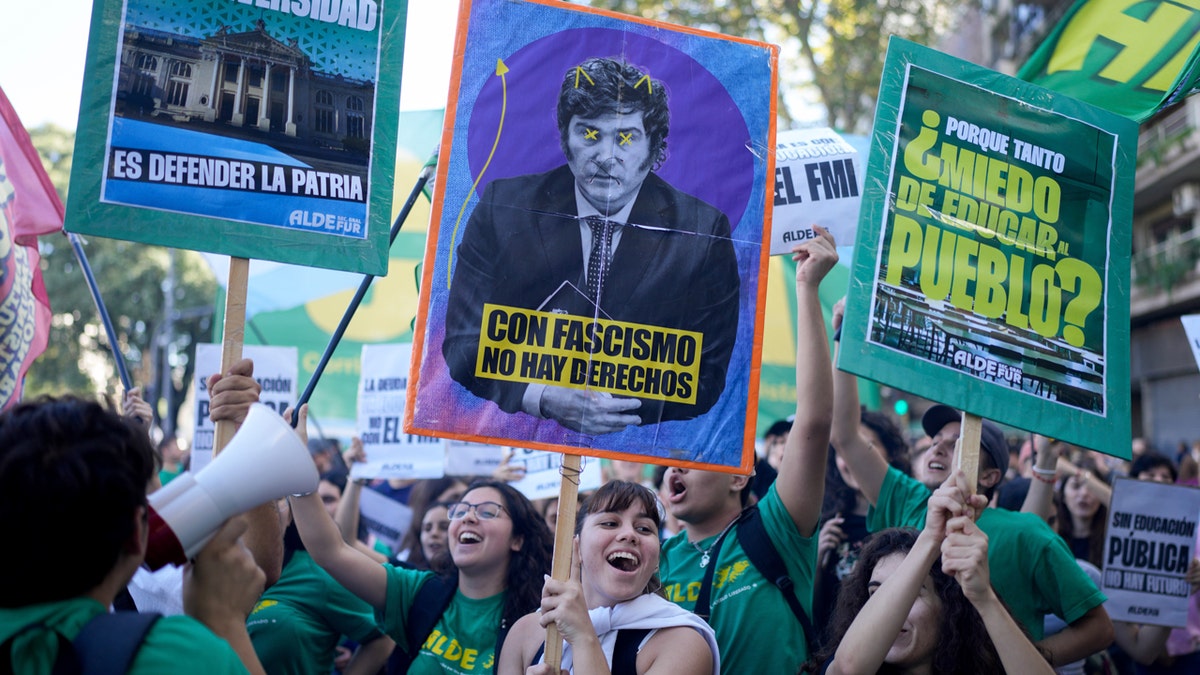
Students protest for more public university funding and against austerity measures proposed by President Javier Milei, featured on the sign, in Buenos Aires, Argentina, Tuesday, April 23, 2024. The posters read in Spanish, “With fascism, there are no rights,” center, and “Why so much fear to educate the people?” and “Defending the university is defending the country.” (AP Photo/Natacha Pisarenko)
The Wall Street Journal, in December 2023, argued that Milei’s tenure “may turn out to be pretty conventional,” with pro-market Economy Minister Luis Caputo leading away from Milei’s more radical plans.
The promised dollarization has been delayed, and Raisbeck explained that Milei’s approach has relied heavily on using the Central Bank to help regulate the economy, though he argued that Milei’s policies remain libertarian due to the deregulation he has pursued in other areas.

A vendor waits for customers at the central market for fruit and vegetables in Buenos Aires, Argentina, Friday, May 10, 2024. (AP Photo/Natacha Pisarenko)
“Everything related to deregulation is very libertarian, and we’ve seen great success already in the housing market, for instance,” Raisbeck said. “So that obviously brought a huge amount of supply that was suppressed because of price controls.”
Milei also brought Argentina back to the international foreground, with a stronger focus on national security and changing up the country’s goals from the previous administration – most notably, he rejected the invitation to join the China and Russia-led economic bloc BRICS.
PERUVIAN LAWMAKERS BEGIN YET ANOTHER EFFORT TO REMOVE PRESIDENT DINA BULARTE FROM OFFICE
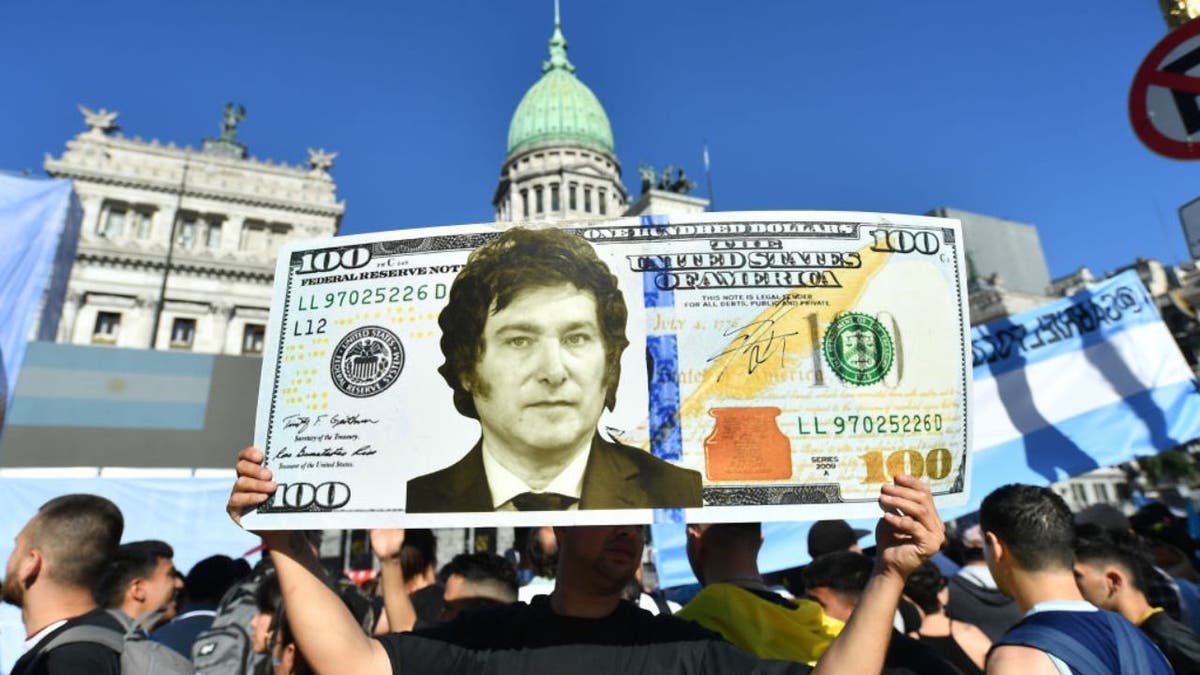
A supporter holds a giant dollar bill with the face President elect Javier Milei as people start gathering outside National Congress ahead of his inauguration ceremony on December 10, 2023, in Buenos Aires, Argentina. (Marcelo Endelli/Getty Images)
Milei argued that it was not “opportune” for Argentina to join the bloc as a full member, according to German outlet DW. However, he will continue to develop ties with its members in the meantime.
“They have a good security minister, Patricia Bullrich, who has experience because she was a security minister in the previous government,” Joseph M. Humire, the executive director of the Center for a Secure Free Society, told Fox News Digital. “She has been able to get the ball rolling very quickly, and I think that was the benefit of having her in that position.”
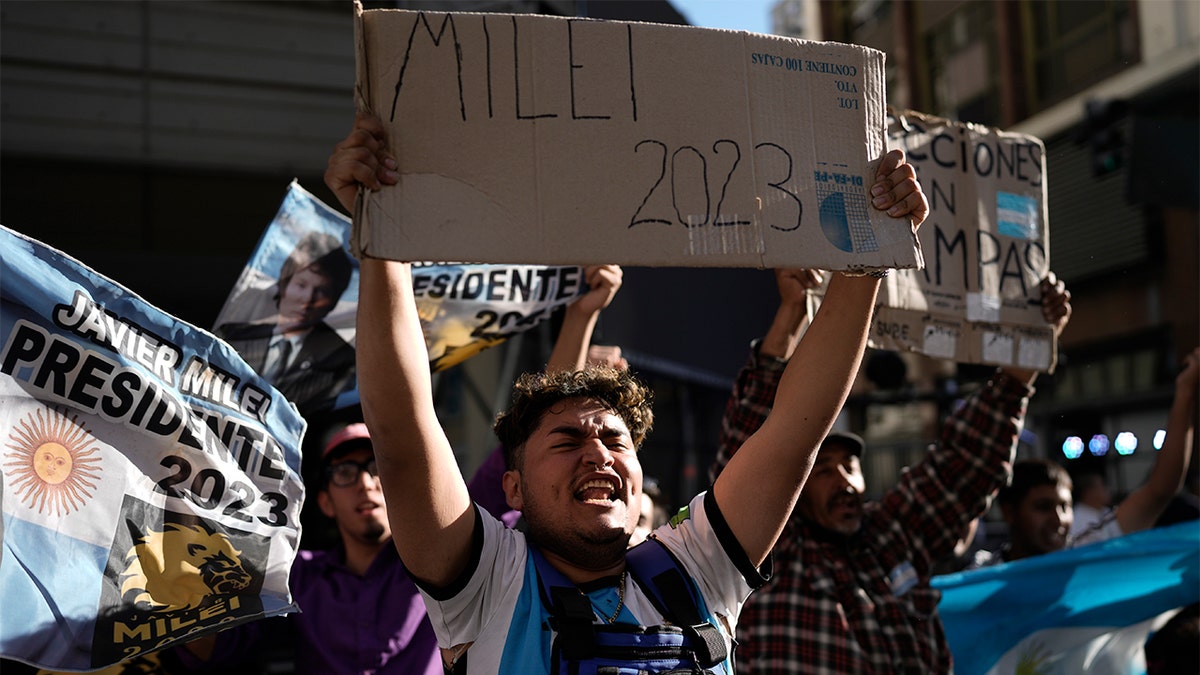
Supporters of presidential candidate Javier Milei gather outside his headquarters during the presidential runoff election in Buenos Aires, Argentina, Sunday, November 19, 2023. (AP Photo/Rodrigo Abd)
Humire explained that Milei’s government has largely focused on clearing out external agitators, particularly those connected to Russian disinformation networks, which remain a paramount concern in most parts of the world as Moscow seeks to expand its influence.
“The external forces are usually the key,” Humire said. “Usually, it’s the Russians. The Russians have probably the biggest disinformation networks to be able to amplify local grievances and turn them into this macro instability, and they did that in Colombia, in Chile.”
“A lot of the specifics of the nation’s security has been in mitigating these agitation networks that create chaos throughout the country, and they have been neutralizing some of these threats while they’re studying others,” he added.
The Associated Press contributed to this report.
World
Russia-Ukraine war: List of key events, day 815

Here is the situation on Sunday, May 19, 2024.
Fighting
- Slavyansk oil refinery in Russia’s southern Krasnodar region halted operations following a Ukrainian drone attack overnight, Interfax news agency reported. The refinery is a private plant with a capacity of 4 million metric tonnes of oil per year, about one million barrels per day.
-
Ukraine’s air force claimed it destroyed all 37 Shahed attack drones launched by Russia overnight. The regions targeted by the drones include Kyiv, Odesa, Mykolaiv, Sumy, Vinnytsia, Zhytomyr, Cherkasy and Kherson.
- The governor of Kharkiv said nearly 10,000 people had been forced to leave their homes since Russian forces launched a surprise ground attack on May 10. Russia claimed its military took control of another village, Staritsya, in the Kharkiv region near the Russian border.
- Ukrainian prosecutors said Russian shelling killed a 60-year-old woman and injured three other civilians in the northeast city of Vovchansk, 5km (3 miles) from the Russian border. A 59-year-old man was also injured in the village of Ukrainske.
- Russia said its forces shot down nine US ATACMS missiles over Crimea and at least 60 drones over Russian sovereign territory. Its forces also shot down a Tochka-U missile fired by Ukraine in Russia’s Belgorod region.
- Belgorod regional Governor Vyacheslav Gladkov said a Ukrainian drone attack injured a woman and a man in the village of Petrovka. The two were treated for shrapnel injuries.
Politics and diplomacy
- Ukrainian President Volodymyr Zelenskyy acknowledged issues with staffing and “morale” within the country’s troops as he signed a mobilisation law that came into force on Saturday. Kyiv has lowered the age at which men can be drafted from 27 to 25 and tightened punishments for those who avoid the call-up.
- Ukrainian prosecutors said they were investigating as a potential war crime a Russian air attack on a residential area of the regional capital, Kharkiv, in which six civilians were wounded, including a 13-year-old girl, 16-year-old male and an eight-year-old.
- Ukrainian officials accuse Russian soldiers in Vovchansk of using dozens of captured civilians as “human shields” to defend their command headquarters.
- Moscow denied deliberately targeting civilians even as thousands have been killed and injured since its February 2022 invasion of Ukraine.
- Poland announced it would spend $2.5bn to fortify its eastern border, which includes Russia, Belarus and Ukraine.
World
Ukraine investigates civilian injuries, battles rage in Kharkiv region

-

 Finance1 week ago
Finance1 week agoSpring Finance Forum 2024: CRE Financiers Eye Signs of Recovery
-

 World1 week ago
World1 week agoIndia Lok Sabha election 2024 Phase 4: Who votes and what’s at stake?
-

 Politics1 week ago
Politics1 week agoBiden’s decision to pull Israel weapons shipment kept quiet until after Holocaust remembrance address: report
-

 News1 week ago
News1 week agoThe Major Supreme Court Cases of 2024
-

 News1 week ago
News1 week agoTornadoes tear through the southeastern U.S. as storms leave 3 dead
-

 World1 week ago
World1 week agoA look at Chinese investment within Hungary
-

 Politics1 week ago
Politics1 week agoTales from the trail: The blue states Trump eyes to turn red in November
-

 World1 week ago
World1 week agoBorrell: Spain, Ireland and others could recognise Palestine on 21 May






/cdn.vox-cdn.com/uploads/chorus_asset/file/25454244/Screenshot_2024_05_18_at_12.02.42_PM.png)
